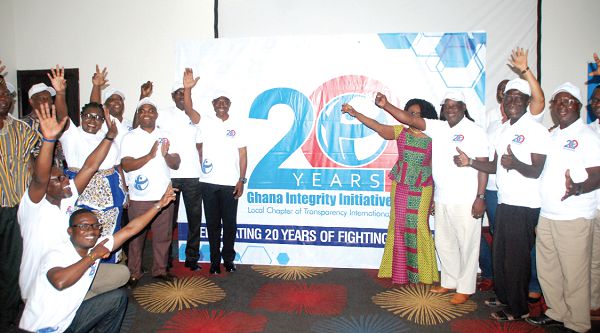
Set up body to regulate financing of political parties — Prof. Atsu Ayee
A lecturer at the Political Science Department of the University of Ghana, Professor Joseph Atsu Ayee, has called for the setting up of a new body to regulate the financing of political parties to curb corruption.
He said the Electoral Commission (EC), which had the mandate to hold parties and politicians accountable for their financing, was already overwhelmed with many responsibilities and that a new body could help regulate the sources of funding of political parties and their candidates effectively by demanding more accountability from them through the declaration of assets and presentation of their audited accounts.
“People have suggested that we need another type of commission which will regulate political parties and this is a very important matter that we need to raise because the EC, as it is now is overwhelmed with responsibilities,” he added.
Anniversary
Addressing the 20th anniversary launch of the Ghana Integrity Initiative (GII) in Accra yesterday, Prof. Ayee said: “We need a more robust legal framework for political parties since party financing is a major source of corruption.”
The event, which was on the theme: “Celebrating 20 years of fighting corruption,” was also used to unveil a new logo of the GII.
It attracted representatives of other civil society organisations, the Netherlands Ambassador to Ghana, Mr Ron Strikker, the clergy and students.
Read Also: Akufo-Addo opens fertiliser factory at Dawhenya
Regulatory framework
Prof. Ayee said Ghana currently lacked a robust regulatory framework for political parties, hence the need to enforce the Political Parties Act, 2000 (Act 574) and other legislations.
He said due to the many responsibilities of the EC, it was only “interested in elections.”
Prof. Ayee said political parties were supposed to make public declaration of their assets, publish their sources of revenues and also publish their annual audited accounts.
“The regulation of political parties’ finances is non-existent and we need to deal with that,” he said, citing the recent National Democratic Congress (NDC) constituency primaries which some candidates claimed they spent GH¢300,000 on.
“Even today, political parties themselves are not aware which sources their candidates get their money from because as a country, we are still grappling with political party financing,” he added.
Institutional capacity
Prof. Ayee also said while leadership was important in spearheading the fight against corruption, it would not achieve desired results “if Ghanaians do not hold the politician accountable.”
He further said for the National Anti-Corruption Plan (NACAP) which spans 2015 to 2024 to be able to achieve its objectives, there was the need for adequate budgetary support for its implementation.
The lecturer urged the government and stakeholders to provide resources to civil institutions such as the National Commission on Civic Education to create awareness about corruption.
“Fighting corruption is an expensive venture in the short term. So let us spend more money for institutions to put in place new systems and processes to reduce various opportunities for corruption,” he stated.
Commendation
For his part, Mr Strikker congratulated the GII for displaying unflinching commitment to the fight against corruption in Ghana over the past two decades.
He said there was the need for the government, civil society organisations and the media to collaborate to expose corrupt practices in society.
A former member of the GII, Mr William Nyarko, said the fight against corruption required the leveraging of investigative journalism, and therefore urged the GII to include an investigative journalist on its board to provide ground-breaking reports.
Activities
As part of activities marking the 20th anniversary, the GII will organise an awards ceremony, stakeholder engagement, business integrity fora, a quiz and a media soiree.
It will also observe the 2019 UN International Anti-corruption Day and a thanksgiving service.
